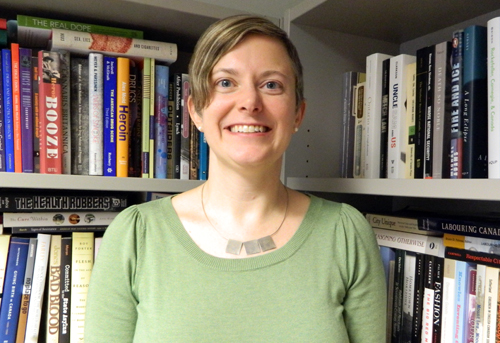
For U of G history professor Catherine Carstairs, writing her recently-published journal article about Guelph author Jean Little had some fringe benefits. “I got to re-read some much-beloved books from my childhood, and I got to meet and interview an author I had always admired,” she says.
Carstairs had tucked away her memories of enjoying Little’s books when she was a child until she realized that some of Little’s papers were in the U of G archives. “Some of my students were using these resources for papers,” she says, “and I thought there might be more that could be done with them.” She used various archived documents to explore the roots and expression of Little’s ideas about those with disabilities and their treatment by the society around them.
As Carstairs explains in her article, published by the journal Histoire sociale/Social History in November 2012, Little was born in Taiwan with scarred corneas and limited vision (she is legally blind). Her parents were both missionary doctors in Taiwan, but moved back to Canada with their children in 1939, when Little was seven years old. When they moved again from Toronto to Guelph, Carstairs writes, “She was bullied so badly her first year in Guelph that she started chewing on her tongue and her hair fell out.”
Little overcame those early challenges, graduated from the University of Toronto, and returned to Guelph to teach disabled children. While teaching, she wrote her first children’s book, Mine for Keeps.
“At that time,” says Carstairs, “there was a lot of focus on children with disabilities, but the discussion tended to be very medical, dealing with treatment and cures. This medical model tended to stigmatize and isolate the disabled.” That influenced the fiction that was written at the time, and even how fundraising campaigns were organized, she adds. “Most of the fiction for children with characters who were disabled ended with a miraculous recovery. Telethons would show disabled children hoping to evoke pity. ”
Little took a different approach. “She didn’t want pity, and she knew that for most people those miraculous recoveries would never happen,” says Carstairs. “She wanted to show children living with disabilities, and wanted people to understand that disability was only one small part of their core identity. Most of the problems the children in her novels experience are ones common to all children – making friends, dealing with a move to a new place.”
In her paper, Carstairs argues that Little’s ideas about the way disabled children and adults could be treated more inclusively were a natural outgrowth of her family’s commitment to social justice. Little’s parents were especially interested in the problems faced by immigrants to Canada and opened their home to many new Canadians who needed some support in getting established. The underlying principle is, as Carstairs writes, “a just society makes the necessary accommodations to allow all of its members to succeed.”
That principle is played out in the children’s stories that have touched so many readers. “Little’s fiction shows the struggles of the disabled very realistically, and suggests that it doesn’t have to be so hard if we as a society would make some small accommodations,” explains Carstairs.
Little’s books were huge best-sellers, and Carstairs suspects that they must have prompted many conversations and possibly some changes in how people thought about the disabled. The author pioneered a very realistic type of story, Carstairs says, adding that initially, Little’s books – while beloved by young readers – were not always well-received. The Toronto public libraries refused to carry them for many years. When Mine for Keeps was translated into Japanese, the translator changed the ending so that Sal, the main character, recovers from cerebral palsy. The new title was “Goodbye, My Crutch.” Little was appalled, Carstairs writes, but the story shows how strange the idea of a happy ending without a miraculous recovery was for many readers.
The highlight of the research process for Carstairs was unquestionably meeting and interviewing Little in her Guelph home. “She was very gracious and very kind, and she has a great sense of humour. I guess it’s not surprising that a children’s author would keep that sense of playfulness and fun. Meeting her was just a delightful experience.”